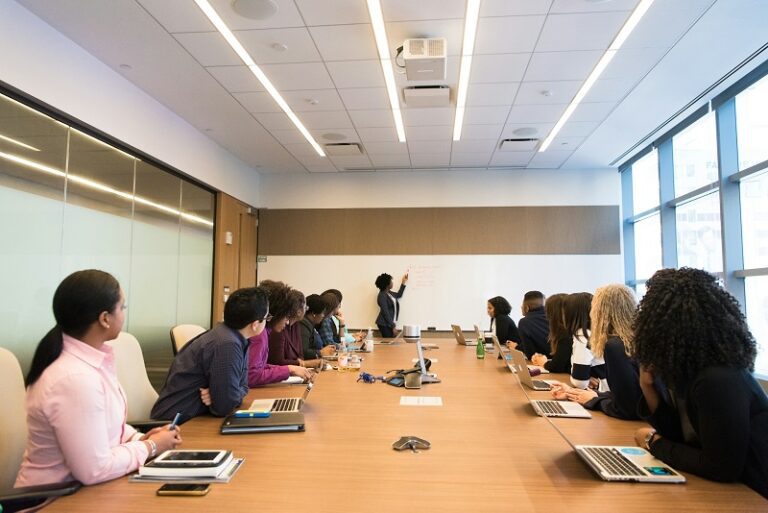In today’s fast-paced and ever-evolving business landscape, the role of a leader is more critical than ever. The modern workplace requires leaders to navigate complex challenges and inspire and motivate their teams to achieve their best. This has given rise to the growing importance of leadership development skills—a set of competencies that leaders must possess to effectively lead and drive organisational success.
This blog will explore the essential leadership skills necessary for thriving in the modern workplace. These skills go beyond traditional management techniques, focusing on the qualities that empower leaders to be effective, empathetic, and forward-thinking.
1. Emotional Intelligence: The Cornerstone of Leadership
Emotional intelligence (EI) is often considered the most important leadership development skill. It refers to the ability to recognise, understand, and manage your own emotions while also being able to influence the emotions of others. Leaders with high emotional intelligence are better equipped to handle stress, resolve conflicts, and create a positive work environment.
Key Components of Emotional Intelligence:
- Self-awareness: Understanding your own emotions and how they impact your behaviour.
- Self-regulation: The ability to control or redirect disruptive emotions and impulses.
- Motivation: A passion for work that goes beyond money and status.
- Empathy: The ability to understand the emotional makeup of others.
- Social skills: Proficiency in managing relationships and building networks.
Developing emotional intelligence can lead to better decision-making, improved team collaboration, and a more inclusive workplace culture. Leaders who exhibit high EI are often seen as more approachable and trustworthy, making it easier for their teams to align with organisational goals.
2. Adaptability: Thriving in Change
The modern workplace is characterised by rapid change—technological advancements, shifts in consumer behaviour, or economic fluctuations. Adaptability is a leadership development skill that enables leaders to remain flexible and open to new ideas while guiding their teams through transitions.
How to Develop Adaptability:
- Stay informed: Keep up with industry trends and innovations to anticipate changes.
- Be open to feedback: Embrace constructive criticism for personal and professional growth.
- Encourage innovation: Create an environment where new ideas are welcomed and explored.
- Lead by example: Be willing to step out of your comfort zone and try new approaches.
Adaptable leaders are better equipped to handle uncertainty and confidently guide their teams through periods of change. They inspire their teams to embrace new challenges and view them as opportunities for growth.
3. Strategic Thinking: Visionary Leadership
Effective leadership requires thinking strategically—seeing the big picture, setting long-term goals, and creating a roadmap. Strategic thinking is a crucial leadership development skill that involves analysing complex situations, identifying potential risks and opportunities, and making informed decisions that align with the organisation’s vision.
Strategies to Enhance Strategic Thinking:
- Practice scenario planning: Explore different scenarios and their potential outcomes to prepare for various possibilities.
- Focus on data: Use data-driven insights to inform your decision-making process.
- Collaborate with others: Engage with colleagues and stakeholders to gain diverse perspectives.
- Prioritise long-term goals: Balance short-term achievements with long-term objectives.
Leaders who excel in strategic thinking can anticipate challenges and proactively address them. They can align their team’s efforts with the organisation’s mission, ensuring sustainable success.
4. Effective Communication: The Bridge to Success
Communication is a fundamental leadership development skill that can improve a leader’s effectiveness. Clear and concise communication is more important than ever in the modern workplace, where teams may be dispersed across different locations and time zones.
Elements of Effective Communication:
- Active listening: Paying full attention to the speaker and responding thoughtfully.
- Clarity: Conveying messages clearly and understandably.
- Transparency: Sharing information openly and honestly to build trust.
- Feedback: Providing constructive feedback that encourages growth and improvement.
Effective communication fosters a culture of openness and collaboration. Leaders who communicate well can articulate their vision, align their teams with organisational goals, and address issues before they escalate.
5. Decision-Making: Balancing Speed and Accuracy
Leaders must often make critical decisions that can significantly impact their organisations. Decision-making is a leadership development skill that involves assessing situations, weighing options, and choosing the best action.
Tips for Effective Decision-Making:
- Gather relevant information: Ensure you have all the necessary data before deciding.
- Consider the risks: Evaluate potential risks and their implications.
- Involve others: Seek input from team members and stakeholders to make more informed decisions.
- Trust your instincts: Sometimes, intuition plays a key role in decision-making, especially when time is limited.
Strong decision-making skills allow leaders to act confidently and efficiently, even in high-pressure situations. By balancing speed with accuracy, leaders can make decisions that drive success and minimise risks.
6. Conflict Resolution: Turning Challenges into Opportunities
Conflicts are inevitable in any workplace, but how a leader handles them can make all the difference. Conflict resolution is a leadership development skill that involves addressing disagreements and finding solutions that satisfy all parties involved.
Steps to Effective Conflict Resolution:
- Identify the root cause: Understand the underlying issues that led to the conflict.
- Stay neutral: Approach the situation without taking sides.
- Encourage open dialogue: Allow all parties to express their viewpoints in a safe and respectful environment.
- Focus on solutions: Work towards a resolution that addresses the concerns of everyone involved.
Leaders skilled in conflict resolution can turn potentially negative situations into opportunities for growth and collaboration. They create a harmonious work environment where differences are respected and resolved constructively.
7. Empathy: Leading with Compassion
Empathy has become an essential leadership development skill in the modern workplace, where employee well-being is increasingly prioritised. Empathy involves understanding and sharing the feelings of others, allowing leaders to connect with their teams on a deeper level.
How to Cultivate Empathy:
- Practice active listening: Show genuine interest in your team members’ concerns and experiences.
- Be present: Give your full attention to the person you interact with.
- Show compassion: Offer support and encouragement, especially during difficult times.
- Acknowledge diversity: Recognize and respect your team’s different backgrounds and perspectives.
Empathetic leaders build strong relationships with their teams, fostering loyalty and trust. By showing compassion, they create a supportive work environment where employees feel valued and understood.
8. Delegation: Empowering Your Team
One key responsibility of a leader is to delegate tasks effectively. Delegation is a leadership development skill that involves assigning responsibilities to others while providing the necessary support and guidance.
Best Practices for Delegation:
- Match tasks to skills: Assign tasks based on the strengths and capabilities of your team members.
- Provide clear instructions: Ensure your team understands what is expected of them.
- Offer support: Be available to provide assistance and resources as needed.
- Trust your team: Allow your team members the autonomy to complete tasks in their way.
Effective delegation empowers your team, enabling them to develop new skills and take ownership of their work. It also frees up your time to focus on higher-level strategic initiatives.
Conclusion
In the modern workplace, effective leadership goes beyond traditional management practices. It requires diverse leadership development skills that enable leaders to navigate complex challenges, inspire their teams, and drive organisational success. From emotional intelligence and adaptability to strategic thinking and innovation, these essential skills are the building blocks of modern leadership.
As the workplace continues to evolve, so too must the skills of its leaders. By continuously developing these essential leadership skills, you can position yourself and your organisation for long-term success in a rapidly changing world.
Incorporating these skills into your leadership development journey will enhance your ability to lead and empower your team to achieve their best. After all, leadership is not just about guiding others—it’s about fostering a culture of growth, collaboration, and innovation that drives collective success.






